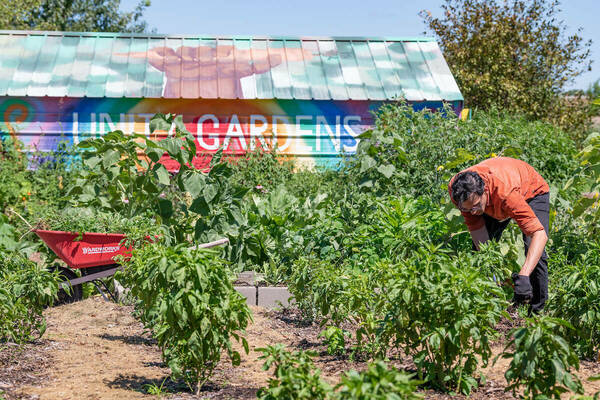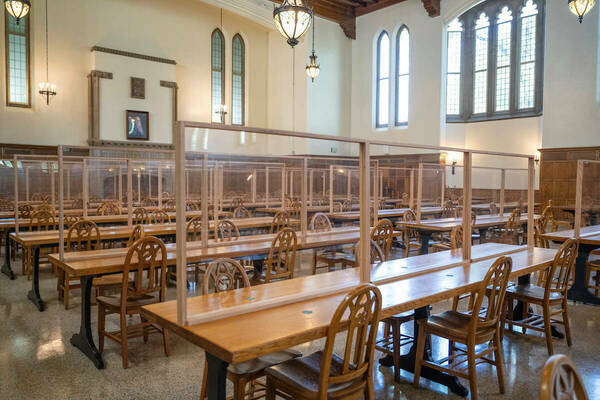
What started as a solution to a student dining challenge on campus during Covid-19 turned into a great opportunity to give back to the community four years later.
One of the two student dining facilities on campus, South Dining Hall opened in 1927 and quickly became a beloved spot for students to share a meal together family style. This tradition continued year after year with the building’s original murals, stone fireplaces, and oak tables and chairs remaining intact as modern updates were made over time.

In 2020, when the student tradition of sharing a meal together came to a screeching halt due to Covid-19, several team members walked through South Dining Hall brainstorming a way that students could safely dine together. Making quick work with the resources already available on campus, the team assembled over 150 plexiglass partitions to screw into the tables. To take it one step further, the partitions were beautifully framed in oak to match the Gothic design of South Dining Hall and maintain the integrity and history of the space.
Four years later, with the pandemic behind us and students back to dining regularly together, the partitions started collecting dust in the basement, no longer of use. That’s when Giuseppe Macerata, associate director of North Dining Hall, started reimagining how the partitions could be used.
"I knew there had to be a better use for these beautiful partitions other than sitting in the basement, whether they remained on campus or were donated somewhere in the community,” said Giuseppe. “It was a great opportunity to think outside the box, reduce combustible load, and be a force for good, which we are committed to as a University and division."

Working closely with Lori Bush, senior director of operations support and special projects, and Geory Kurtzhals, director of sustainability, the team devised a plan to partner with Unity Gardens, a local nonprofit that connects our community to fresh food, nature, and one another. They teach free classes year round on gardening, cooking, and sustainability, host community events, and more. The partitions were incorporated into Unity Gardens’ programming, serving as teaching boxes for students in the community and panels on a greenhouse.
“The day Giuseppe suggested we recycle the leftover plexiglass, I immediately recognized it as the right thing to do,” said Lori. “His enthusiasm was infectious, solidifying my belief that this project was more than just environmental. The project positively and immediately impacted everyone involved, from the thought giver to the sustainability office staff to the delivery drivers to the Unity Gardens employees. The therapeutic effect will only continue to grow as these recycled materials are put to use in the gardens, bringing joy for years to come.”
There is no question that the University of Notre Dame is committed to sustainability, with a goal to become carbon neutral by 2050. The campus dining team greatly contributed to this mission when they innovatively repurposed these partitions in a clean, eco-friendly way.
“This opportunity arose because our campus dining team members kept sustainability in mind as they considered what to do with these outdated items,” said Geory. “The easy solution would have been to send them to the landfill, but instead, they took the time to consider other opportunities and identified a local organization that could benefit from receiving these materials. This is a small example of pausing and considering our greater mission to help care for our common home.”
So, the next time you share a meal in South Dining Hall, look for the markings on the iconic oak tables where the partitions once were fastened, adding another layer of history to this beloved dining establishment and etching the campus dining team as a leader in making a greener tomorrow.
Originally published by at experience.nd.edu on July 01, 2024.